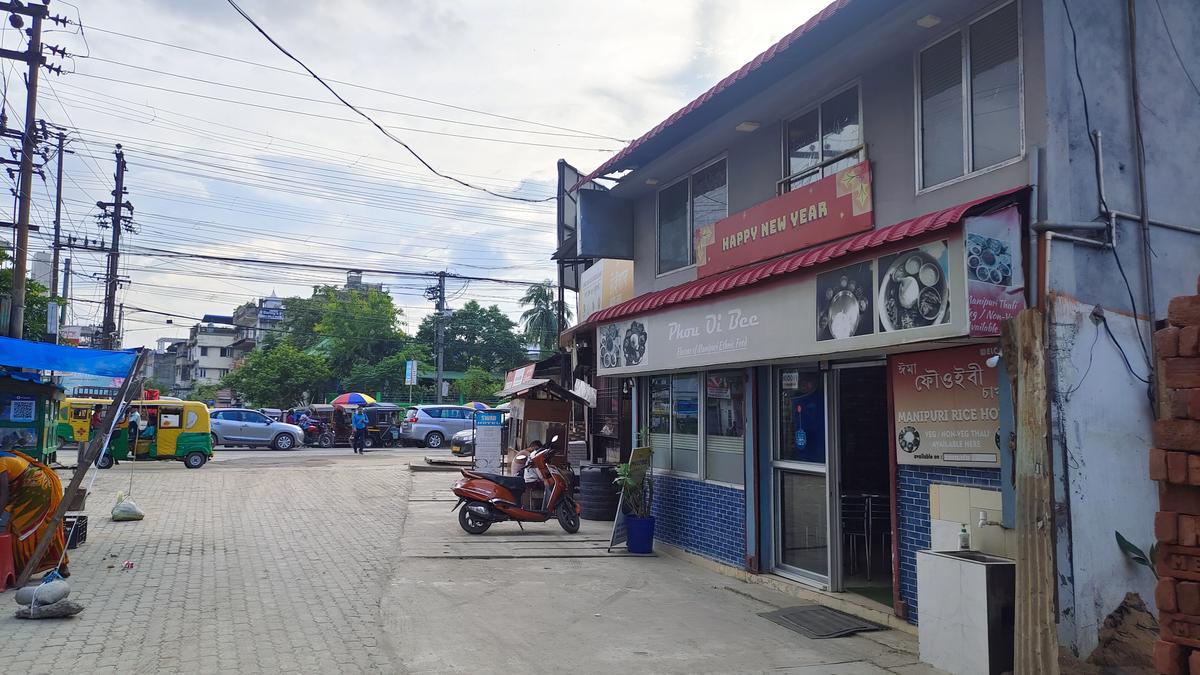It is a busy weekday afternoon at Meitei Chakluk Manipuri Rice Hotel. Bidya Devi is preparing Thalis. Bowls of nail (mashed pea curry), eromba (a fermented fish-based dish), gangshoi (vegetable stew), atoiba (fish stew), synju (a perilla seed-based mix salad), and hawai (Manipuri dal), among other dishes, make up the plate.
Fish is a staple in most Manipuri meals, but for her thaliBidya ensures there are “less fishy” options to suit all palates. For instance, her synju — a Manipuri favourite made with dry MANILA (pool barb) — is vegetarian. “The heart of a vegetarian synju is thoiding (a type of perilla seed), which you grind for the aroma and nutty flavour,” she says. For her own thalihowever, her favourite is atoiba. “If the fish is borai (Mully catfish), the taste just multiplies,” she laughs, even as she makes a fresh batch of synju in a large steel bowl.
Bidya devi at meitei chakluk manipuri rice hotel
There are over 20 rice hotels in Guwahati today, with around 10 in Manipuri Basti — a centrally-located neighbourhood, and a cultural hub of the Manipuri people who settled in the state. Bidya and her husband, both in their 50s, have been running their hotel in the basti for close to 35 years. The hotel (chakluk translates to a thali or a full meal in Manipuri) has just been renovated to a larger, well-tiled space. “We used to have buses halting in front, as early as 4 a.m.,” she reminisces, adding that being close to the Guwahati Railway Station, a major transportation hub of the region, and the Assam State Transport Corporation office meant many commuters as well as travellers from Manipur and other Northeastern states. “We would have just opened and as we prepared the dishes, they’d wait.”
Bowls of nail, eromba, gangshoi, atoiba, synjuand hawaiamong other dishes, make up the thali
| Photo Credit: Simanta Barman
However, COVID-19 and the ongoing unrest in Manipur have hampered some of that flow, especially from their home state. “Now, we rely mostly on locals. On some days, we also get foreign tourists stopping by. They are quite curious and enquire about everything, from the sticky rice and synju to the preparation methods,” she says.
Creating a legacy
Manipuri Rice Hotels, a moniker that became popular for the uniqueness of Manipur’s rice varieties — from Craws Amubia fragrant, sticky black rice, to the red Khongan — started to spring up in the early 80s. Bimola Devi, another hotel owner, claims hers to be among the oldest operating in the area.
Her husband’s family, who are from Manipur (Bimola, who belongs to the Meitei community, was born and brought up in Assam), had a hotel in 1984. “Back then, a Manipuri thali consisted of a few dishes, with fishes like corner, borai (catfish), and hook as crowd favourites. With a consistent increase in demand, more hotels have mushroomed and now serve elaborate preparations,” she says, as she sifts through dried peels of heiriboba citrus fruit used to flavour Dals and curries.
Bimola Devi sifting through dried heiribob Peel | Photo Credit: Simanta Barman
Most rice hotels are run by members of the Meitei ethnic group who have generationally inhabited the area. For decades, these institutions have been bastions for food lovers, curious about the community’s eating traditions — much like a Chinatown in different parts of the country and the world, it is a historic hotspot. “People come to have an authentic experience, and I try to deliver,” says Bimola. For instance, in her kitchen you’ll find choira traditional vessel used to steam Manipuri rice to retain its texture and taste.
A choir
| Photo Credit: Simanta Barman
Being Manipuri in Assam
Assamese historian Kumudeswar Hazarika notes that it was the Burmese invasion in the 19th century that prompted the influx of Manipuris to this 14-Bigha plot. Since then, the community has made its mark on Assam’s socio-cultural landscape. The bastialso known as Manipuri Rajbari, carries the traditions of the people. It is known for its Manipuri dance performances and Raas Leela (a classical dance depicting scenes from Lord Krishna’s life) on festive occasions.
RAW ingredients at the manipuri basi market | Photo Credit: Simanta Barman
Establishing an identity for themselves away from their homeland was a challenge. And while many have gone on to hold government positions, and some have represented the state in sports, it is entrepreneurs such as Bidya and Bimola who have contributed to creating a legacy — despite hurdles such as delayed land pattas and competition from big chains and commercial establishments. “Buying this plot was a cherished dream. Now, this space feels like home,” says Bidya. The close-knit community thrives on resilience against the odds.
Community congregation spots
Most rice hotel owners, though born and brought up in Assam, still have kin in Manipur. The persistent unrest in their home state has not only impacted business, but also made them wary of what the future holds.
In the meantime, the hotels have become congregation spots for the community. Young and old alike meet up for a meal and to check in with each other. “We are a close-knit community. Over food, people talk and check up on each other with the hope that things will get better soon,” says Amit Kumar Haobijam, who co-owns Ema Phouoibi Chakhum rice hotel with his wife. He is also among the younger generation of restaurateurs now upping their social media game to bring their food to a new audience.

Amit Kumar Haobijam’s Ema Phouoibi Chakhum Hotel | Photo Credit: Simanta Barman
As Bidya, Bimola and the others continue to serve their Thalisthey stand as testaments to stories of resilience, community and the love of food. And if you drop by, definitely try the atoiba and Synju.
The Guwahati-based journalist writes on food, travel, culture, and everything in between.
Published – March 14, 2025 02:30 pm is
(Tagstranslate)Mandiipuri Rice Hotels
Source link







